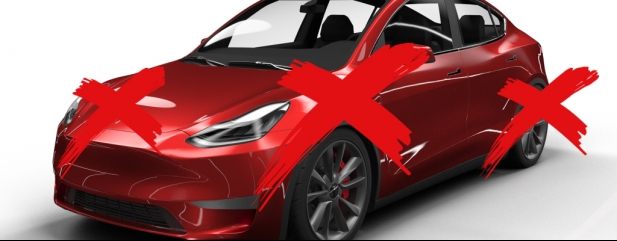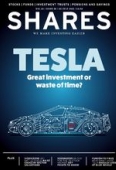Archived article
Please note that tax, investment, pension and ISA rules can change and the information and any views contained in this article may now be inaccurate.
Why Tesla is a bad investment

There is no question electric vehicles will play a key role in the future of urban transport and in reducing greenhouse gas emissions. Under the International Energy Agency’s Sustainable Development Scenario, there could be 230 million vehicles on the road by 2030 compared with just 10 million last year.
For the winners, the spoils are potentially vast. Bloomberg estimates the market opportunity between 2020 and 2040 to be $24 trillion.
The question is whether Tesla is a long-term winner, and does it represent an attractive investment? Based on its valuation, the progress being made by its competitors, the firm’s lack of real earnings, its lack of a long-term strategy and its poor corporate governance, I would argue it isn’t.
1. LUDICROUS VALUATION
The most obvious case for not buying Tesla is its ludicrous valuation. The current $581 billion market cap compares with vehicle revenues of $31 billion in the 12 months to March, or a multiple of 18.7 times. In terms of units, Tesla delivered just 587,000 vehicles over the period at an average price of just under $53,000.
Even factoring in full production of the Model 3 sedan and the Model Y compact SUV from Shanghai, which will take several years, annual production will still be less than 1 million units. Meanwhile, the average selling price will be lower due to fewer sales of the more expensive Model S and Model X.
If by 2024 Tesla can produce – and sell – 950,000 vehicles a year at say $50,000 apiece, annual sales could rise to $47.5 billion, which is still less than a tenth of the firm’s current market value.
Compare these figures with mainstream manufacturers like Ford, which makes the world’s best-selling vehicle, the F-150, and Volkswagen, which is among the biggest investors in electric vehicles. Ford generates annual revenues of $130 billion and VW generates annual revenues of €250 billion yet both are valued at just 0.5 times sales.
It seems obvious that, as these and other manufacturers increase EV production and take market share from Tesla, this valuation gap will close as mainstream car makers’ ratings rise and Tesla’s falls until they reach some equilibrium.
2. DON’T UNDERESTIMATE THE COMPETITION
According to the IEA, global sales of electric vehicles grew 41% last year to 3 million units or just under 5% of all new car sales, taking the global ‘park’ to 10 million.
This resilience, given total car sales were down 15% last year, is due to three factors: supportive regulatory frameworks, purchase incentives and the falling cost of battery technology, which is making electric vehicles cheaper.
In the first quarter of 2021, electric vehicles sales jumped 140% driven by demand in Europe and China, while US sales more than doubled, albeit from a low base.
Having had the field to itself for much of the last decade, Tesla is now facing genuine competition. Of the world’s top 20 manufacturers, 18 have plans to rapidly scale up their electric vehicle production.
Tesla is already ceding market share. According to investment bank Credit Suisse, its global share of electric vehicle sales tumbled to 11% in April from 29% in March as the firm lost ground in China, Europe and the US to new competitors with cheaper models.
After its Chinese sales tumbled in April on production issues, Tesla posted a recovery in May, but it was outshone by local electric vehicle makers Nio and Xpeng which reported growth in deliveries of 95% and 483% respectively.
However, the top selling electric vehicle in the world’s largest vehicle market is the Hong Guang Mini. A four-seater city car produced by a joint venture between General Motors and state-owned car makers SAIC and Guangxi Automobile, the Mini has sold more than a quarter of a million units since it was launched last July.

With zero sales tax, the cheap and cheerful Mini costs around $4,500 and is infinitely customisable. Having bought them as a second vehicle, many owners now use them as their primary means of city transport.
The manufacturers are targeting annual sales of 1.2 million vehicles next year, or nearly three times Tesla’s total output from its Shanghai plant.
In its home market, Ford is powering ahead with its Ford+ EV programme. Electric vehicle sales in May were up 184% on the strength of the hybrid F-150, the Mustang Mach-E SUV – which is selling out as soon as it hits dealerships – the Explorer hybrid SUV and Escape compact SUV, and the average selling price is going up.
New rivals Lucid and Polestar have launched high-performance models at the top end of the market, and Apple – which has been toying with launching an electric vehicle since 2014 – is in talks with Chinese firms CATL and BYD to supply it with batteries for a rumoured 2024 launch.
In Europe, VW more than doubled Tesla’s sales in the 12 months to May and the German firm continues to grow its lead according to Schmidt Automotive Research. Of the 856,000 electric vehicles sold during the period, VW accounted for 206,000 units while Tesla slipped to fifth place with 102,500 units, behind Renault/Nissan, Hyundai/Kia and Stellantis.
Tesla’s German plant is nowhere near opening, and even when it does the firm will find it hard to compete with the huge range of electric vehicles already on the market.
Storm Uru, manager of the Liontrust Global Equity Fund (B28R330), believes electric vehicle manufacturing costs will collapse so that within five years they are on a par with conventional cars. Just as Apple invented the smartphone and now struggles to hold a 10% market share, he believes Tesla will lose out to the volume carmakers, in particular VW.
3. THE CAR BUSINESS LOSES MONEY
Bulls of Tesla can at least point to the fact that first quarter profits of over $1 billion were better than expected. However, Tesla presents its figures on a non-GAAP (Generally Accepted Accounting Principals) basis.
On a GAAP basis, net income was $438 million or 60% less than the touted figure. Moreover, during the quarter Tesla received $518 million in regulatory credits and booked $101 million of gains from the sale of bitcoin, so in fact the car making business lost money, which has been the case since the firm joined the stock market.
While unit volumes were higher, average selling prices were down 13% after a hiatus in production of the higher-priced Model S and Model X and as a greater number of lower-priced cars were sold in China. Supply chain costs were higher, as were research and development costs, which it could be argued are non-discretionary in such a competitive industry.
Going forward, average selling prices will likely continue to fall meaning the level of credits will be lower, while the company still needs to invest billions in getting its Chinese and German factories to full manufacturing capacity, so there seems little prospect of Tesla making a profit from car manufacturing for some time, bringing us back to the issue of valuation.
4. NO CLEAR STRATEGY
Tesla has had the electric vehicle market almost to itself for much of the past decade, and while it has made good use of that time to grow it has never had an over-arching strategy.
Instead, strategy is made up on-the-fly. Production targets are fired off, then typically missed. Range is described as a top priority, then it isn’t. The Model S Plaid+ model went on sale for advance orders, only for the programme to be cancelled months later.
The firm recently unveiled the $130,000 Model S Plaid, with a top speed of 200 miles per hour and a 0 to 60 time of less than two seconds, which is utterly non-sensical when most electric vehicle owners use them for urban driving.
There are hints the company wants to create a lifestyle brand after it applied for three new trademarks that broadly cover restaurant services, self-service and take-out restaurant services, which makes no commercial sense.
In contrast, the volume carmakers are also investing tens of billions of dollars to put electric vehicles at the centre of their long-term strategies.
Earlier this year, Volkswagen presented a vision of the electric vehicle as part of the wider energy eco-system, integrated into the home and public buildings, allowing customers to be independent of the grid while reducing emissions.
On the small Greek island of Astypalea, VW is replacing all 1,500 combustion engine vehicles with electric cars, vans and scooters, with charging points powered by solar panels and wind turbines to create ‘an eco-lab for decarbonisation’.
VW isn’t alone in dreaming big. Toyota is building an entire city at the foot of Mount Fuji in Japan to trial its self-driving electric vehicle technology and provide a blueprint for urban centres of the future.
As charging networks become denser, electric vehicles will be able to use smaller battery packs which will substantially reduce their overall cost. VW aims to cut battery costs by up to 50% by using a single unified cell technology and use its economies of scale to make ‘e-mobility’ genuinely affordable.
According to the firm Transport & Environment, VW is the only volume carmaker in the world with a credible strategy to electrify its entire range by 2030 and take the fight to Tesla.
5. GOVERNANCE RED FLAGS
Chief executive Elon Musk’s erratic, anti-establishment behaviour – smoking cannabis while appearing on a podcast, praising then damning bitcoin, backing ‘meme stocks’ and violating US Security and Exchange Control rules with his tweets about taking the company private – may endear him to some but it is increasingly out of tune with the governance codes of serious investors.
There is also the question of executive compensation. In the first quarter of this year, Musk took $299 million in share-based compensation thanks to his 2018 performance award after the company hit a market value of $650 billion and based on what the company called ‘a new operational milestone becoming profitable’.
Basing compensation on the company’s share price, market cap or earnings targets encourages management to think short-term and is old fashioned.
Lastly, while the SEC may have forced Musk to step down as chairman, there remain concerns over the independence of the board and the ability of shareholders to call for change or challenge management.
Tesla appears to lack direction strategically and is facing greater competition than ever before, yet the shares are still valued on outlandish multiples and what earnings there are depend on government subsidies. Combined with the firm’s poor record on corporate governance, I can find no reason to own the stock.
Important information:
These articles are provided by Shares magazine which is published by AJ Bell Media, a part of AJ Bell. Shares is not written by AJ Bell.
Shares is provided for your general information and use and is not a personal recommendation to invest. It is not intended to be relied upon by you in making or not making any investment decisions. The investments referred to in these articles will not be suitable for all investors. If in doubt please seek appropriate independent financial advice.
Investors acting on the information in these articles do so at their own risk and AJ Bell Media and its staff do not accept liability for losses suffered by investors as a result of their investment decisions.
Issue contents
Editor's View
Feature
- Why Tesla is a bad investment
- Why Tesla is a good investment
- Stiff competition stymies Liontrust ESG investment trust launch
- Stocks making highs and lows and how investors can use this information
- Tesla: Great investment or waste of time?
- Governments near agreement on global corporate tax ‘alignment’
- The winning and losing investments so far in 2021

 magazine
magazine








